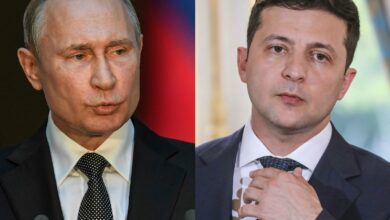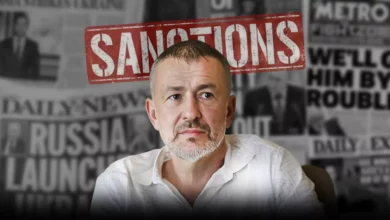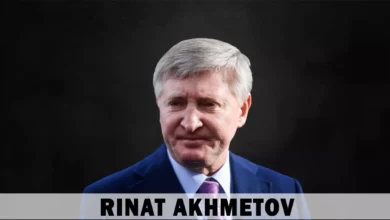Australia Takes Action: Sanctioning 7 Russian Prison Officers in Navalny Investigation
Australia sanctions 7 Russian prison officers over Navalny's dead
Amidst growing global concerns over the poisoning and subsequent arrest of Russian opposition leader Alexei Navalny, Australia has taken a strong stand by imposing sanctions on seven Russian prison officers believed to be involved in his detainment. This move showcases Australia’s commitment to supporting human rights and condemning actions that violate international norms. With Navalny’s health deteriorating rapidly while in detention, the international community has been calling for action against those responsible (Russian Prison Officers ) for his mistreatment mainly the Russian prison officers .
The targeted Russian Prison Officers are alleged to have played a role in the suppression of Navalny’s lawful activities and his subsequent deterioration in health. By imposing these sanctions, Australia is sending a clear message to Russia and the rest of the world that it will not tolerate the violation of human rights and the suppression of political dissent. This action sets Australia apart as a staunch advocate for justice and accountability on the global stage, and highlights the country’s commitment to upholding democratic values.
Background on the Navalny case
The Navalny case has captured the attention of the world due to its grave implications for human rights and political dissent. Alexei Navalny, a prominent Russian opposition leader and anti-corruption activist, was poisoned with a nerve agent in August 2020. After being treated in Germany, Navalny returned to Russia and was subsequently arrested upon his arrival. The arrest was widely regarded as an attempt to silence Navalny and stifle his political influence. Since then, Navalny’s health has continued to deteriorate while in detention, leading to widespread concerns about his well-being and calls for justice.
The Navalny case has not only highlighted the issue of human rights violations in Russia but has also exposed the challenges faced by political dissidents and activists around the world. It has sparked an international outcry and calls for action against those responsible for Navalny’s mistreatment. Australia’s decision to impose sanctions on Russian prison officers involved in Navalny’s detainment is a significant step towards holding accountable those who violate human rights and suppress political dissent.
Australia, known for its commitment to democratic values and human rights, has taken a firm stance in support of justice and accountability. The imposition of sanctions on the Russian prison officers sends a clear message that such actions will not be tolerated, irrespective of the geopolitical ramifications. It demonstrates Australia’s dedication to upholding international norms and standing up for the rights of individuals like Navalny who face persecution for their beliefs.
Overview of Australia’s sanctions policy
Australia’s sanctions policy is designed to promote international peace, security, and human rights. The country has a long-standing commitment to upholding democratic values and supporting efforts to address human rights abuses. Australia’s sanctions regime allows the government to target individuals, entities, and governments involved in activities that threaten these values.
In the case of the Russian prison officers involved in Navalny’s detainment, Australia has opted to impose targeted sanctions. These sanctions include travel bans and asset freezes, preventing the individuals from entering Australia and accessing their assets within the country. By targeting the individuals directly responsible for Navalny’s mistreatment, Australia aims to hold them accountable for their actions and deter future violations of human rights.
Australia’s sanctions policy is guided by international law and the principles of justice and accountability. The country works closely with its international partners to identify individuals and entities that should be subject to sanctions. This collaborative approach ensures that Australia’s sanctions are effective and aligned with the broader international efforts to address human rights abuses and promote democratic values.
Reasons for imposing sanctions on Russian prison officers
The decision to impose sanctions on seven Russian prison officers involved in Navalny’s detainment is rooted in a commitment to justice and the protection of human rights. The targeted individuals are believed to have played a direct role in suppressing Navalny’s lawful activities and contributing to his deterioration in health while in detention. Their actions constitute a violation of international norms and a clear disregard for human rights.
By imposing sanctions on Russian prison officers , Australia is not only expressing its condemnation of these actions but also sending a strong message to Russia and the international community that such behavior will not be tolerated. The sanctions serve as a form of punishment for the individuals involved and a deterrent for others who may consider similar actions in the future. Additionally, the sanctions aim to provide a measure of justice for Navalny and those who have been affected by his mistreatment.
It is important to note that the decision to impose sanctions is not taken lightly. Australia carefully assesses the evidence and consults with its international partners to ensure that the sanctions are targeted and effective. The goal is to hold accountable those directly responsible for human rights abuses while minimizing the impact on innocent individuals and the broader population.
Impact of the sanctions on the individuals and their assets
The imposition of sanctions on the seven Russian prison officers involved in Navalny’s detainment will have significant consequences for the individuals and their assets. The targeted individuals will be subject to travel bans, preventing them from entering Australia for any purpose. This restriction not only limits their ability to travel but also serves as a public acknowledgment of their involvement in human rights abuses.
In addition to the travel bans, the sanctions include asset freezes, which prevent the Russian prison officers from accessing their assets within Australia. This measure aims to disrupt their financial activities and holds them accountable for their actions. By freezing their assets, Australia sends a clear message that profiting from human rights abuses will not be tolerated.
The impact of these sanctions extends beyond the targeted individuals themselves. It serves as a deterrent for others who may be involved in similar activities. The fear of facing similar consequences can contribute to a change in behavior and discourage further human rights abuses. Furthermore, the imposition of sanctions demonstrates Australia’s commitment to justice and accountability, reinforcing the country’s reputation as a staunch advocate for human rights on the global stage.
International response to Australia’s sanctions
Australia’s decision to impose sanctions on the Russian prison officers involved in Navalny’s detainment has received international attention and garnered both support and criticism. The international response to these sanctions has been mixed, reflecting the complex nature of global politics and differing perspectives on human rights issues.
Many countries and human rights organizations have applauded Australia’s strong stance and commitment to justice. They view the sanctions as an important step towards holding accountable those responsible for human rights abuses and promoting international norms. The move has been seen as a demonstration of Australia’s leadership on human rights issues and a call to action for other nations to follow suit.
However, there have also been voices of criticism and skepticism. Some argue that the sanctions, while well-intentioned, may not be sufficient to address the broader issues at hand. They question the effectiveness of sanctions as a tool for promoting justice and argue for the need for broader international cooperation to address human rights abuses. These critics emphasize the importance of a comprehensive approach that includes diplomatic efforts, dialogue, and engagement with the countries involved.
Despite the differing opinions, Australia’s decision to impose sanctions has sparked a global conversation about the role of sanctions in addressing human rights abuses. It has brought attention to the need for coordinated international efforts to promote justice and accountability, and has highlighted Australia’s willingness to take a leading role in this endeavor.
Analysis of the effectiveness of sanctions in promoting justice
The effectiveness of sanctions as a tool for promoting justice and holding accountable those responsible for human rights abuses is a subject of ongoing debate. While some argue that sanctions are an effective means of exerting pressure and deterring future violations, others question their long-term impact and advocate for a more comprehensive approach.
Sanctions can have a range of effects, both intended and unintended. On the one hand, they can impose financial and diplomatic costs on individuals and entities involved in human rights abuses. This can disrupt their activities, limit their ability to profit from their actions, and serve as a deterrent for others. Sanctions can also send a strong message of condemnation and solidarity with the victims of human rights abuses.
On the other hand, sanctions may not always achieve their desired outcomes. They can be circumvented, leading to limited effectiveness. Additionally, sanctions may have unintended consequences, affecting innocent individuals and exacerbating the economic and social hardships faced by the broader population. There is also the risk of sanctions becoming a tool of political leverage rather than a means of promoting justice.
To maximize the effectiveness of sanctions, it is crucial to ensure they are targeted, coordinated, and part of a broader strategy. Australia’s decision to impose sanctions on the Russian prison officers involved in Navalny’s detainment demonstrates a commitment to these principles. By working closely with its international partners, Australia aims to ensure that the sanctions are effective in promoting justice and accountability while minimizing unintended negative consequences.
Australia’s role in the global fight against human rights violations
Australia has long been recognized as a staunch advocate for human rights and democratic values on the global stage. The country’s commitment to justice, accountability, and the protection of human rights is reflected in its foreign policy and actions. Australia actively engages in international efforts to address human rights abuses, promote democratic governance, and support those who are oppressed or persecuted.
The decision to impose sanctions on the Russian prison officers involved in Navalny’s detainment is just one example of Australia’s commitment to the fight against human rights violations. By taking a strong stand and holding accountable those responsible for human rights abuses, Australia sends a clear message that such actions will not be tolerated.
Australia’s role in the global fight against human rights violations extends beyond the imposition of sanctions. The country actively participates in international forums and organizations dedicated to promoting human rights, such as the United Nations Human Rights Council. Australia also provides support and assistance to countries working towards improving their human rights records, offering expertise, resources, and guidance.
Through its actions and engagement, Australia aims to contribute to a world where human rights are respected, democratic values are upheld, and justice is served. The imposition of sanctions on the Russian prison officers involved in Navalny’s detainment is a testament to Australia’s unwavering commitment to these principles.
Similar cases of international sanctions for human rights abuses
The imposition of international sanctions for human rights abuses is not a new phenomenon. Over the years, there have been several cases where countries and international organizations have opted to impose sanctions as a means of addressing human rights violations and promoting justice.
One notable example is the case of Myanmar (formerly Burma). Following the military coup in 2021 and the subsequent violent crackdown on pro-democracy protesters, many countries, including Australia, imposed sanctions on the military junta and its leaders. These sanctions targeted the individuals and entities responsible for the coup and the subsequent human rights abuses. The aim was to pressure the junta to restore democracy, release political prisoners, and address the human rights concerns raised by the international community.
Another example is the case of North Korea. In response to the country’s nuclear weapons program and its human rights record, the United Nations, the United States, and other countries have imposed a series of sanctions to curtail North Korea’s activities and hold its leaders accountable. These sanctions have targeted the country’s nuclear and missile programs, as well as individuals and entities involved in human rights abuses.
These cases highlight the international community’s willingness to utilize sanctions as a tool for promoting justice and accountability. While the effectiveness of sanctions in achieving their intended outcomes may vary, they serve as a visible and tangible expression of condemnation and a call for action. They can exert pressure on those responsible for human rights abuses, disrupt their activities, and contribute to a change in behavior.
The future of Australia’s sanctions policy
The imposition of sanctions on the Russian prison officers involved in Navalny’s detainment is indicative of Australia’s commitment to justice, human rights, and the promotion of democratic values. It sends a clear message that Australia will not tolerate the violation of human rights and the suppression of political dissent.
Moving forward, Australia’s sanctions policy is likely to continue evolving in response to emerging challenges and changing global dynamics. The country will remain active in addressing human rights abuses, supporting democratic governance, and holding accountable those responsible for violations. Australia will collaborate with its international partners to identify individuals and entities that should be subject to sanctions, ensuring that the sanctions are targeted, effective, and aligned with broader international efforts.
Australia’s sanctions policy will also need to take into account the potential limitations and unintended consequences of sanctions. It is crucial to strike a balance between holding accountable those responsible for human rights abuses and minimizing the impact on innocent individuals and the broader population. Australia will continue to assess the effectiveness of its sanctions measures and explore ways to enhance their impact and ensure their alignment with broader diplomatic and engagement strategies.
Conclusion
Australia’s decision to impose sanctions on seven Russian prison officers involved in Navalny’s detainment is a significant step towards promoting justice, accountability, and the protection of human rights. By taking a strong stand against those who violate international norms and suppress political dissent, Australia sends a clear message that such actions will not be tolerated. The imposition of targeted sanctions showcases Australia’s commitment to upholding democratic values and supporting the fight against human rights abuses on the global stage.
The Navalny case has brought international attention to the challenges faced by political dissidents and activists around the world. It has sparked a global conversation about the role of sanctions in promoting justice and accountability. Australia’s decision to impose sanctions has been met with both support and criticism, reflecting the complex nature of addressing human rights abuses on the international stage.
Moving forward, Australia will continue to play an active role in the global fight against human rights violations. The imposition of sanctions on Russian prison officers is just one aspect of Australia’s broader commitment to justice, human rights, and democratic values. By working closely with its international partners, Australia aims to promote international peace, security, and the protection of human rights. The future of Australia’s sanctions policy will be shaped by emerging challenges, changing global dynamics, and the ongoing pursuit of justice and accountability.




